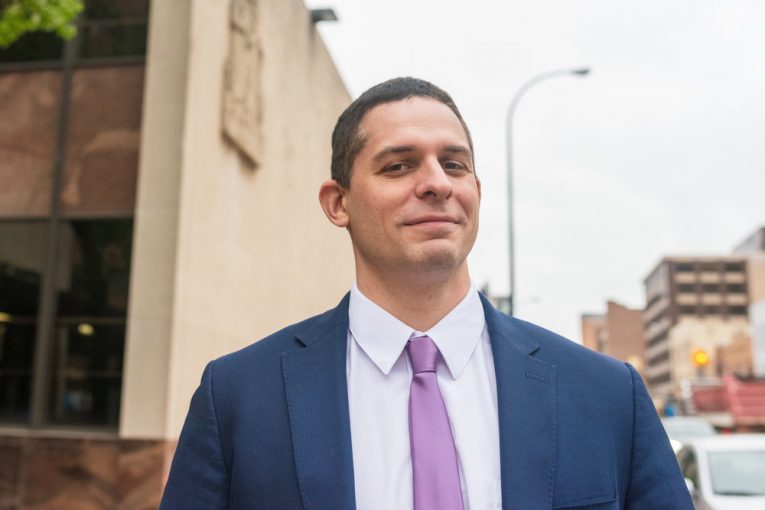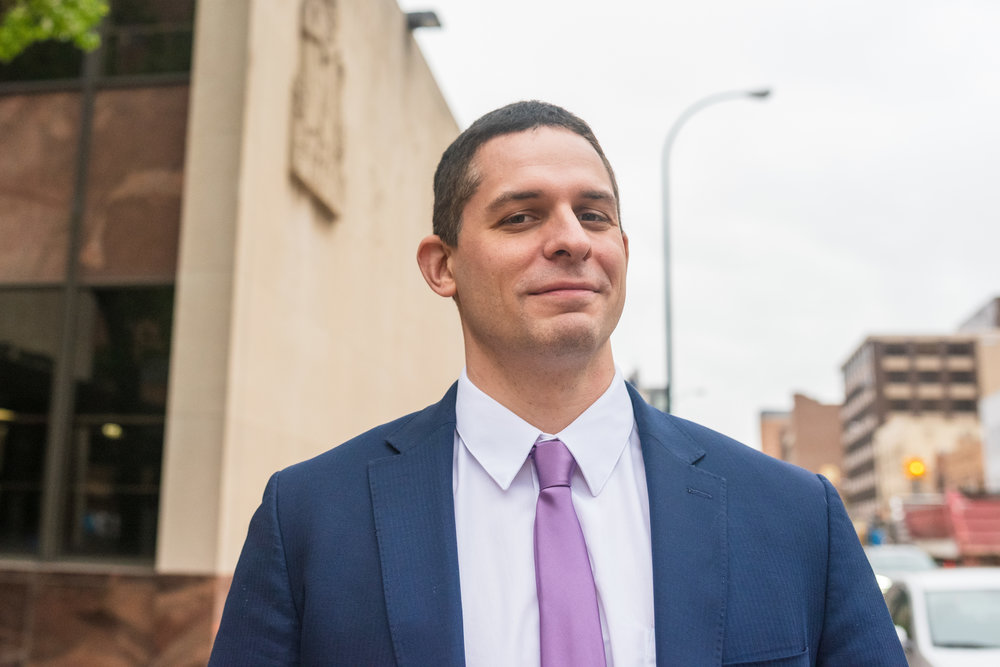

By Tanya Decendario and Linhchi Nguyen
ANN ARBOR, MI – Washtenaw County’s newly-elected prosecutor, Eli Savit, began his term with a “Criminal Justice Listening Tour” prior to launching a series of progressive criminal justice reforms.
Seeking ideas for change, Savit conducted the listening sessions across Washtenaw County, in person and online, where he encouraged input by community members about the need for reform.
Issues relating to racial disparities in Washtenaw County’s criminal justice system, including how to hold prosecutors and judges accountable when implementing systemic changes, were central to the discussion.
“I just wanted to go out there and listen to people’s experiences with the justice system, their hopes for what the justice system in Washtenaw County could become, and what they saw as the most urgent need for change,” Savit said.
He also listed common concerns that people voiced during the tour, such as racial inequities in the county and the need for better ways to help those with substance abuse problems that don’t involve “cycling through the justice system over and over again.”
In response to these discussions, Savit announced his plans to reduce bias in the prosecutor’s office and promised to no longer prosecute possession of psychedelics at the county level.
“One of the things that I’ve been working on during this transition period is an independent third-party evaluator to come in and identify the various points in the prosecutor’s office that we are seeing disparate treatment between people of color and white people,” Savit said.
A recent report published by Citizens for Racial Equality in Washtenaw found that prosecutors, who generally have wide discretion over what charges to bring against someone, charge people of color more frequently and harshly than they do white people.
According to Savit, the third-party evaluator would allow the prosecutor’s office to understand the causes of those disparities outlined in the report.
He hopes to share the metrics measuring this disparate treatment online, so they would be available for constituents to see the office’s progress on equity and hold judges and prosecutors accountable.
Regarding substance use, Savit said in a statement to the advocacy group, Decriminalize Nature Ann Arbor, that he supports the Ann Arbor City Council decriminalization vote on entheogenic plants and will extend the policy county-wide.
“The Ann Arbor City Council resolution, of course, applies only in Ann Arbor,” he stated. “But, consistent with the resolution, I do not plan to prosecute the use the possession of entheogenic plants in any other part of the county.”
A native of Washtenaw County, Savit attended Ann Arbor Pioneer High School and graduated in 2001. After teaching history and special education in New York City, he returned to Ann Arbor to attend University of Michigan Law School.
After law school, Savit’s legal career began with working for two federal judges as an appellate and Supreme Court lawyer. In private practice, he represented folks with immigration proceedings, disabled kids seeking their right to education, domestic violence cases, victims of consumer fraud, and criminal defendants.
Savit was then selected to work for U.S. Supreme Court Justices Ruth Bader Ginsburg and Sandra Day O’Connor as a law clerk. During his time at the Supreme Court, Savit was offered work with major D.C. law firms, which he turned down. Instead, he returned to Ann Arbor, Michigan, and accepted an appointment as a senior legal counsel for the City of Detroit.
The issues regarding the broken justice system motivated Savit to run as a prosecutor. His campaign focused on reforming the criminal justice and cash bail systems, supporting specialized courts that assist veterans, individuals with addiction and mental health issues, and setting priorities for prosecution of violent crimes, and corporate wrongdoers.
“It means your tax dollars will no longer be used to lock people up who pose little danger. It means you can rest easy, knowing that your elected prosecutor is going after wrongdoers who pose a real threat to your well-being. It means that, if you or your loved ones are ever involved in the criminal justice system, you’ll know that you’ll get a fair shake,” he maintains.
His campaign was endorsed by local, state, and national progressive leaders such as former Michigan gubernatorial candidate Abdul El-Sayed, State Sen. Jeff Irwin, Ypsilanti City Councilwoman Annie Sommerville, and Sen. Bernie Sanders, who said, “We need district attorneys and prosecutors who understand that their job is not throwing people in jail but that their job is fighting for justice.”
Another supporter of Savit was Alex Thomas, who is also a Ypsilanti Township resident and activist. He explained how Savit’s campaign “was definitely different when you look at traditional prosecutors, but he’s right on target when you look at the progressive prosecutorial movement.”
In one of their meetings together, Thomas noted Savit’s outrage when reviewing data that highlighted the severe disparities in Washtenaw County.
“To get someone in a position of power that really, from a community member standpoint, shares that sense of outrage and is not so tolerant of the status quo…that was one reason I got involved in [Savit’s campaign],” said Thomas.
Looking into the future, Savit stated that ending cash bail in the majority of cases will be one of his first priorities. He also wants to enact policies that will revolve around a restorative, rather than punitive, approach to criminal cases. He believes that restorative justice remedies are always driven by the victim and aren’t about letting offenders off easy.
“You should expect an announcement about us and our community partners very soon after we take office dramatically expanding the availability of restorative justice,” said Savit.
More generally, he hopes to work on curbing racially-motivated prosecutions and building an alternative to the juvenile court system such that young people who have committed offenses can “grow from their mistakes rather than going through the criminal justice system.”
Expressing his excitement for his upcoming term, he said, “There are going to be a number of policy and program changes based on our listening tour sessions, and I think that’s something the community is hungry for.”
 Tanya Decendario is a third-year student studying Legal Studies at UC Berkeley. She is originally from Sonoma, CA, but currently resides in Albany, CA.
Tanya Decendario is a third-year student studying Legal Studies at UC Berkeley. She is originally from Sonoma, CA, but currently resides in Albany, CA.
Linhchi Nguyen is a fourth year at UC Davis, double majoring in Political Science and English. She currently lives in Sacramento, California.
To sign up for our new newsletter – Everyday Injustice – https://tinyurl.com/yyultcf9
Support our work – to become a sustaining at $5 – $10- $25 per month hit the link: